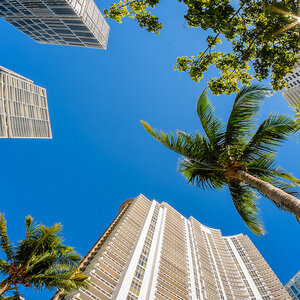The WPJ
THE WORLD PROPERTY JOURNALReal Estate Facts Not Fiction
Residential Real Estate News

Hong Kong Residential Prices Forecasted to Rise 5 Percent in 2017
Residential News » Hong Kong Edition | By Michael Gerrity | December 2, 2016 9:00 AM ET
According to JLL's Year-end Hong Kong Residential and Land Market Review 2016, notwithstanding the latest stamp duty measure, residential prices are expected to rise up to 5% next year. The competitive in land market will continue next year due to the influx of mainland developers and new local players. It has become harder for Hong Kong heavyweight developers to win development sites.
Hong Kong Land Sales Update
Land prices rebounded in the second half of 2016, as more prime sites were made available for sale amid active participation from PRC and local developers. About 62% of the residential sites made available for sale via government tender this year drew PRC developers, uplift from the 53% recorded in 2015. PRC developers were on the winning end of 24% of all residential sites sold this year, on par with that a year ago. Their increased participation in the local public land sales market has been driven by a combination of yuan devaluation, a desire to diversify away from mainland cities and supply constraints of the local market over the longer-term.
Increased competition in the public land sales market saw 10 out of 13 residential sites sold at prices above market expectations in the second half of the year, in contrast to the first half of the year when no sites were sold above the higher end of market estimates. Also, there has been an increase in the average waiting time between winning bids by developer from 12.6 months in 2015 to 27.6 months in 2016 (year-to-date). Looking ahead, we may see more developers entering into joint ventures to increase their chances of winning in government tenders.
Dorothy Chow, Regional Director of Valuation Advisory Services at JLL in Hong Kong said: "In 2016, Hong Kong's heavyweight developers faced increased competition from both mainland developers and new local players. It has become harder for them to win land sites and we believe the situation will continue into 2017. Mainland developers will remain active in government land sales to expand their business in Hong Kong whilst local developers will likely focus more on opportunities in the New Territories and MTR projects.
However, the public land sales market does face some uncertainties, including:
- Policy risks such as demand-side measures, which can distort market dynamics;
- Risks in the global economy and volatility in financial markets, which can hit market confidence; and
- Changing policy direction in China, which can affect the land banking strategies of developers, as well as the appeal of Hong Kong properties to mainland buyers.
Hong Kong Residential Market Update
Average monthly residential sales rebounded 55% y-o-y to 6,123 in the second half of 2016. A buoyant stock market, post-Brexit capital inflows seeking safe-haven investments and strong pricing the public land sales market all contributed to the uplift. Capital values of mass residential properties rebounded by 9.5% (as of October) from their in-year lows (last trough in May 2016), reversing much of decline recorded earlier in the year to post full-year growth of 1.6%. Capital values in the luxury segment of the market stayed largely flat in 2016, reflecting the greater resilience of that market; especially in the very top-end of the market where capital values have remained solid throughout the year.
Notwithstanding, overall sales volumes in 2016 should remain below 2015 levels (55,982 transactions), as sales activity is expected to soften following the government's decision to raise stamp duties across the board to 15% on 4 November. Whilst volumes are likely to take a hit over the near-term, we expect prices to remain broadly stable for a number of reasons:
- Pent-up demand among first-time buyers, who are exempt from the new higher stamp duty levy, remains strong.
- The loophole for investors (without any holdings) to acquire multiple properties under a single ASP to minimise stamp duty payments also remains in place.
- Despite the anticipated hike in interest rates, mortgage rates remain accommodative as banks seek to capture market share.
- The primary market will continue to drive momentum, as developers with stronger financial standing and more robust balance sheets are able to offer cash rebates to alleviate the impact of the new stamp duty rates.
The drop off in demand comes at a time when more supply is set to be launched onto the market, albeit through an increase in the number of small units. 29% of all new private housing supply is expected to be Class A units (saleable area less than 429 sq. ft) between 2017 and 2019; equivalent to about 6,300 units a year, which is substantially higher than the annual average level of 700 units produced between 2007 and 2011 (before the government introduced the Buyer's Stamp Duty and Double Stamp duty). The increase in the supply of small units is a product of the government's market cooling measures, which has effectively steered developers to build smaller-sized flats given the more affordable lump sum payments involved.
Joseph Tsang, Managing Director and Head of Capital Markets at JLL said: "Under the latest cooling measure, residential sales volumes will shrink over the short-term as buyers adopt a wait-and-see attitude. Developers will need to reassess their sales strategies. But this measure is unlikely to have a huge impact on capital values, given strong pent-up demand, large number of cash-rich buyers in the market (including mainland Chinese buyers), and still low mortgage rates. Hence, while volumes are likely to soften, we expect capital values of mass and luxury residential to remain broadly stable and rise by up to 5% in 2017. The rental market for luxury properties, on the other hand, is forecasted to fall by up to 5% given the ongoing tenant downgrading trends that have characterized the market for the past 12-months."
Sign Up Free | The WPJ Weekly Newsletter
Relevant real estate news.
Actionable market intelligence.
Right to your inbox every week.
Real Estate Listings Showcase
Related News Stories
Residential Real Estate Headlines
- U.S. Homebuyer Median Down Payment Hits Record $67,500
- New Home Sales in America Jump in July
- Zombie Foreclosures in U.S. Decline in Q3, Reaching Lowest Levels Since 2021
- U.S. Home Sales Uptick in July, First Time in 5 Months
- Italy's 2024 Tourism Boom, Tax Perks Energizing Local Home Sales
- U.S. Builder Confidence Moves Lower in August
- U.S. Mortgage Rates Dip to Lowest Levels in Over a Year in Mid-August
- DOJ, NAR Commission Payment Changes Take Effect August Seventeenth
- U.S. Foreclosures Jump 15 Percent Month Over Month in July
- Over 2.6 Million Western U.S. Homes at Risk of Wildfire Damage in 2024
- Opportunity Zone Homes Across America Enjoy Price Gains in Q2
- Orange County, Chicago, Phoenix, and Washington DC Become Trillion Dollar U.S. Housing Markets
- Los Angeles, San Diego and New York Have Highest Concentrations of Renter Households
- Greater Las Vegas Area Home Sales, Prices Rise in July
- People Are Still Moving at Scale From Fire-Prone to Heat and Flood-Prone America
- Buyer Agent Commission Rates Declining in Wake of NAR DOJ Settlement in 2024
- Miami's Brickell Office Market Hits Record $200 Square Foot Rents in 2024
- U.S. Pending Home Sales Rise 5 Percent in June, First Time in 3 Months
- California Home Sales Dip 3 Percent Annually in June
- Macau's Residential Sales Continue to Decline in 2024
- Greater Miami Residential Sales Slide 13 Percent Annually in June
- Greater Orlando Area Home Sales Down 11 Percent in June
- U.S. Home Sales Slipped Dipped 5.4 Percent in June
- Foreign Investment in U.S. Residential Properties Plummet 21 Percent Over Last 12 Months
- U.S. Housing Rents Growing Fastest in Unexpected Places in 2024
- U.S. Mortgage Rates Tick Down in Mid- July
- Mortgage Bankers Oppose Biden Campaign's Nationwide Rent Control Proposal
- Apartment Building Permits in U.S. Drop Nearly 30 Percent Since Pandemic
- Global Home Price Growth Accelerates in 2024
- Las Vegas Area Condo Prices Rise 7.3 Percent Annually in June
- America's Home Affordability Issues Worsen in Mid 2024
- U.S. Mortgage Applications Dip in Late June
- Greater Palm Beach Area Residential Sales Dip 7 Percent in May
- Typical U.S. Home Selling Less Than List Price in June
- Mortgage Rates in U.S. Dip in Late June
- U.S. Pending Home Sales Fall to All-time Low in May
- Greater Miami Home, Condo Prices Continue to Rise in May
- Ireland Home Prices Rise in Q2, Driven by Inventory Shortages
- Home Sales in U.S. Dip for Third Consecutive Month in May
- Homebuilder Confidence in the U.S. Drops to 2024 Low in June
Reader Poll
Marketplace Links
This website uses cookies to improve user experience. By using our website you consent in accordance with our Cookie Policy. Read More





